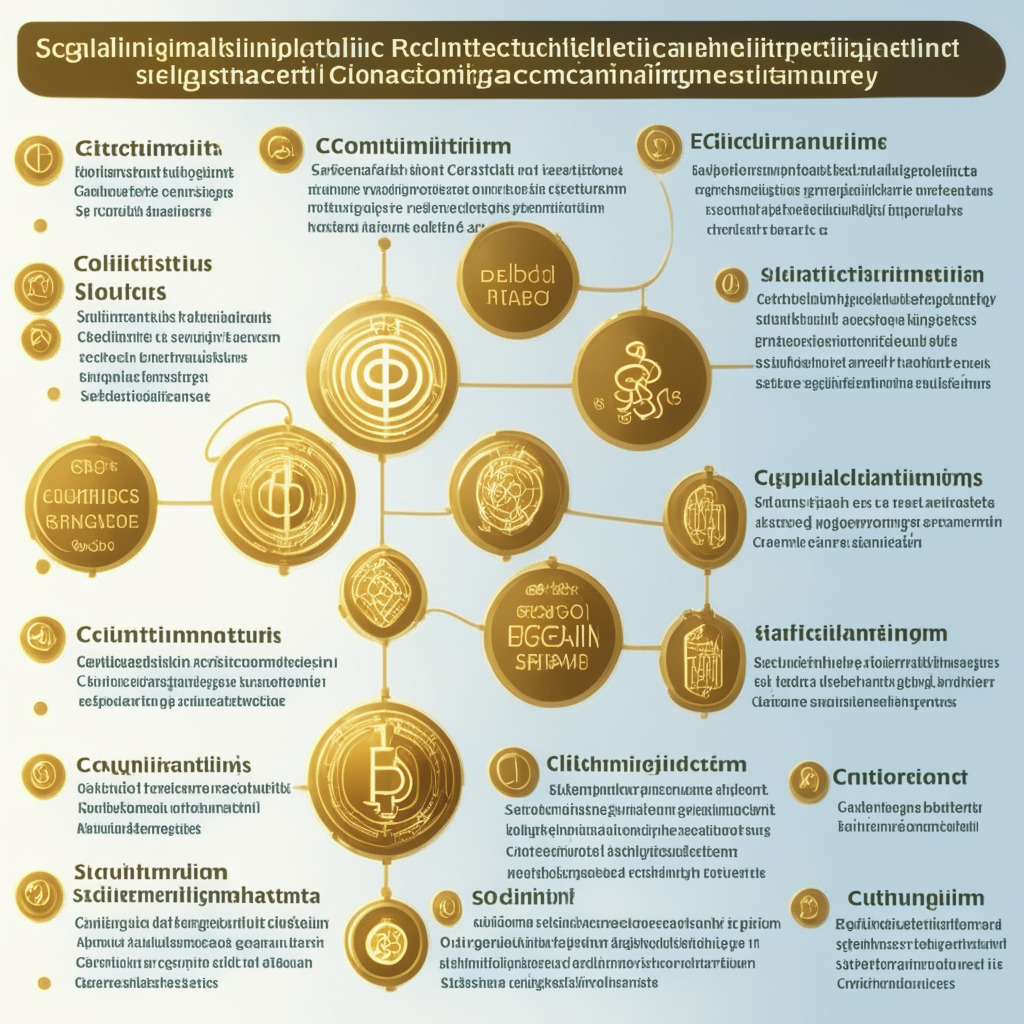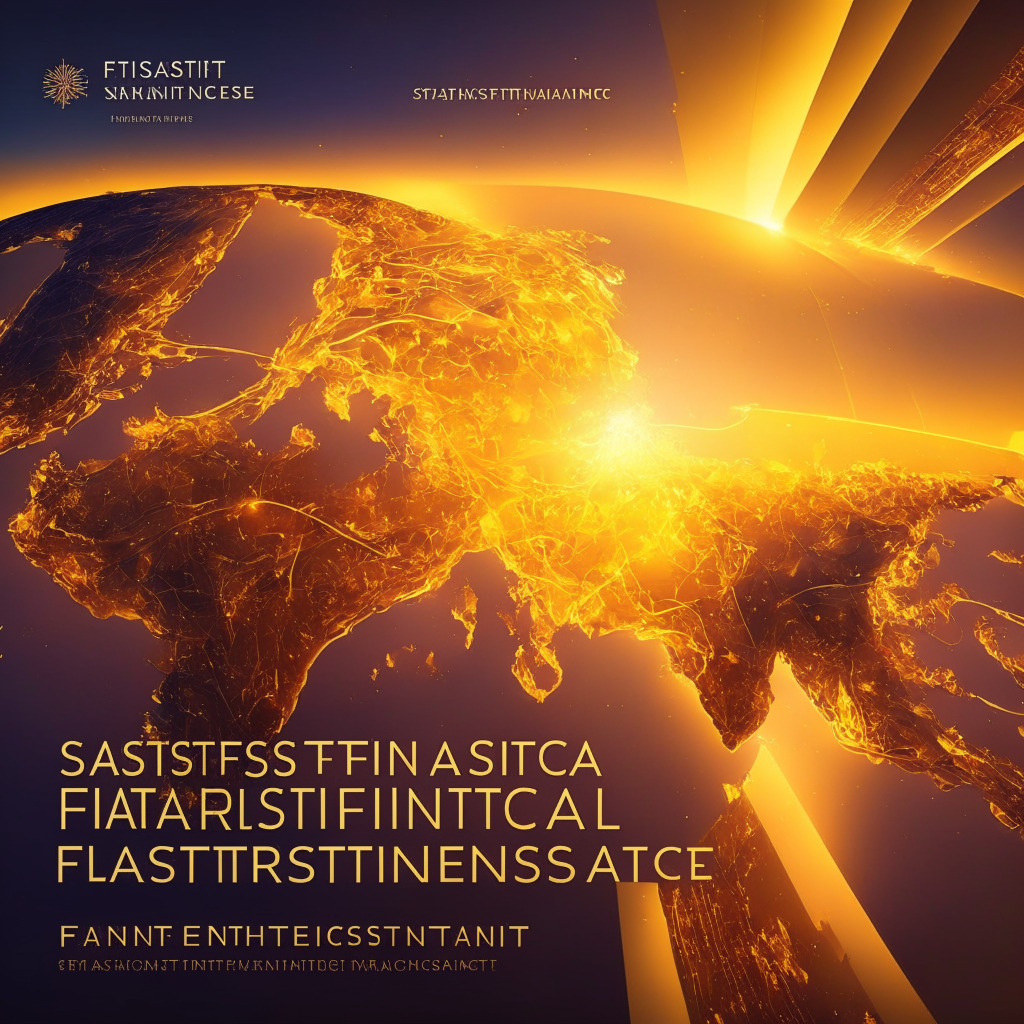Stablecoin issuer Circle has strategically pared down its workforce and redirected focus on its core business, in response to the prolonged downturn in cryptocurrency markets. They continue to employ globally in key areas and show growing interest in Asian markets.
Search Results for: Tres Finance
Navigating Cryptocurrency Regulation: Upcoming Legislative Proposal by US Senators Lummis and Gillibrand
US Senators Cynthia Lummis and Kirsten Gillibrand are to propose a new legislation known as the ‘Responsible Financial Innovation Act’, aimed at regulating cryptocurrencies and digital assets. The bill plans to classify most cryptocurrencies as commodities and enforce crypto exchanges to store consumer assets in third-party trusts, enhancing security. Critics argue it may also create unintended consequences.
Fueling Cryptocurrency Fever: Spotlight on High-Potential Coin Opportunities Amid Inflation Forecasts
“Cryptocurrencies show positive stance amid BlackRock’s speculated Bitcoin ETF application. Coins like Mina Protocol and innovative projects like DeeLance offer intriguing investment opportunities. Mentioned tokens including $DLANCE, $COMP, $WSM, and Solana present potential for notable returns, yet caution is suggested due to high-risk nature of cryptocurrencies.”
Cybersecurity in the Crypto World: Unraveling the Challenges and Implementing Countermeasures
“In an ever-evolving crypto world, cybersecurity is a priority. The Bank For International Settlements (BIS) has proposed a seven-point plan intended to fortify digital assets, mainly central bank digital currencies (CBDCs), against cyber threats due to their complex systems, large attack surfaces, and numerous potential points of failure.”
Ripple’s Venture: Exploring Tokenization’s Potential in the Real Estate Industry
Ripple Labs announced its venture to transform the real estate sector via tokenization, using the Ripple’s CBDC platform to tokenize real estate holdings for use as loan collateral. This innovative method aims to revolutionize conventional asset management and ownership, improving liquidity, accessibility, and security despite possible regulatory challenges and security concerns. The implementation of blockchain-based tokenization could profoundly reshape traditional systems and industries.
Emerging Legislative Storm: Namibian Crypto Regulations and Their Potential Impact
Namibia’s National Assembly is taking steps towards regulating cryptocurrencies and their service providers, with penalties for non-compliance including a N$15 million fine or 10-years jail. The proposed legislation establishes a Regulatory Authority aimed at safeguarding consumer interests, preventing market manipulation and fostering innovation in virtual assets.
Ethereum Scaling Solution StarkNet’s Quantum Leap: Spectacular Throughput Enhancement and Its Implications
StarkNet, Ethereum’s scaling solution, test launched StarkNet Quantum Leap, a layer-2 network aiming at performance enhancement and throughput improvement. With throughput increased tenfold, this upgrade could quicken transaction processing significantly. Despite often compromising a network’s decentralization, this high throughput is critical for user-friendly, decentralized finance applications. StarkNet’s new upgrade also plans to substitute the “PENDING” transaction status with “ACCEPTED_ON_L2”.
Measuring L1 Blockchain Viability: The Shift from Traditional Metrics to YTP Analysis
The article discusses the importance of assessing layer-1 blockchains profitability using a Years-to-Profitability (YTP) ratio method. It highlights the role of emissions schedule and tokenomics in projecting future costs. Furthermore, the article stresses the value of YTP as a tool in measuring a blockchain’s profitability and sustainability, particularly in relation to burn mechanisms and supply dynamics.
Navigating the Rocky Road to CBDC Adoption: Overcoming Obstacles and Addressing Pitfalls
Crypto researcher Fadi Aboualfa casts doubt on the efficiency of Central Bank Digital Currency (CBDC) platforms as substitutes for cash, noting their failure to address vital technical parameters. He highlights interoperability issues and warns of potential consumer trust crises in the event of a bank scandal affecting branded CBDCs.
Crypto Market Maturation: Adapting to Regulations and Catering to Institutional Investors
The cryptocurrency market is evolving towards maturity and adapting to regulatory mandates, with traditional finance standards becoming the norm to accommodate institutional investor demand. Lincoln Bartlett, Head of Trading at Anchorage Digital, notes that safer environments, increased regulatory scrutiny, and advanced trading platforms are essential for crypto’s broader adoption.
Battling Australian Bank Restrictions: Crypto’s Fight for Economic Freedom in the Land Down Under
Blockchain Australia plans to tackle crypto payment restrictions imposed by Australian banks, including the Commonwealth Bank, head-on by using real data. The industry body stresses individuals’ inherent right to decide financial matters and aims to implement consumer education programs on crypto benefits and identifying scams. The future of Australia’s blockchain industry significantly depends on banks adopting targeted methods while maintaining economic freedom.
Crypto Exchange’s Battle with Regulations: Impact on Markets and Safety in Nigeria and Beyond
Nigeria’s SEC declared Binance Nigeria Limited as “illegal” and ordered operations to cease. This follows Nigeria passing the Finance Act 2023, imposing a 10% capital gains tax on digital assets. Binance faces ongoing lawsuits, highlighting challenges for crypto exchanges in adapting to changing regulatory landscapes and emphasizing the importance of vigilance and awareness for market stability.
Gary Gensler’s SEC Stance: Crypto Regulation Divide and the Quest for Innovation Balance
SEC Chair Gary Gensler dismisses the notion that crypto assets and exchanges are special, emphasizing the importance of following established financial regulations. The crypto community seeks a balance between regulatory oversight and fostering innovation, stressing the need for a regulatory environment that supports the industry’s rapid growth without compromising investor protection.
SEC Lawsuit & Binance: Chokepoint 2.0 or Protecting Crypto Principles?
SEC’s lawsuit against Binance has stirred the crypto community, with Cardano’s Charles Hoskinson calling it an attempt to implement “chokepoint 2.0” and promote Central Bank Digital Currencies. This has sparked a debate between “freedom and authoritarianism,” highlighting the importance of the fundamental principles and nature of cryptocurrencies now at stake in the face of regulatory actions.
Creating the Ultimate Crypto-Friendly Bank: Overcoming Challenges and Seizing Opportunities
Santiago R. Santos recently proposed building a new “crypto-friendly bank” to fill the void left by the collapses of major crypto-friendly banks. Despite challenges, Santos envisions assembling a team, guided by his experience from the crypto and traditional finance worlds, to create a bank servicing individuals, businesses, and institutions in the ever-growing crypto industry.
Japanese Banks Embrace Stablecoins: Will US Institutions be Left Behind?
Japan’s recent legal framework for stablecoins signals a move towards bridging traditional and decentralized finance, while the US faces regulatory hurdles and uncertainty. Japanese banks are now preparing to issue stablecoins as the country embraces distributed ledger technology for faster, cheaper payment systems.
Empowering Indie Filmmakers: Blockchain’s Impact on the Future of Cinema
The adoption of blockchain technology in the film industry empowers indie filmmakers, improves inclusiveness, and redefines financing, distribution, and ownership. It breaks the monopolistic grip of traditional studios, enabling marginalized creators to tell untold stories and amplify their voices.
Merging Web2 and Web3: Revolutionizing Content Consumption & Earning Crypto
Web3, the next stage of the internet, promises to revolutionize industries like finance and entertainment through blockchain technology. MyCo, a Dubai-based streaming platform, aims to combine Web2 and Web3 for maximum benefits, rewarding users with cryptocurrency for content consumption and forging partnerships with established media organizations to create a sustainable content distribution landscape.
Film3 Movement: Revolutionizing Cinema with Web3 and NFTs, Challenges Ahead
The inaugural MetaCannes Festival highlights the Film3 movement, which utilizes Web3 technologies to empower minorities and underrepresented voices in the traditional film industry. By embracing decentralized financing methods like NFTs, Film3 aims to give more power to creators throughout a movie’s lifecycle, revolutionizing the way we experience cinema.
FATF Clarification on Crypto Regulations: Unpacking Pakistan’s Ban and Global Implications
The Financial Action Task Force (FATF) clarified that it doesn’t require member countries to ban virtual assets and service providers. Instead, FATF stresses understanding and mitigating money laundering and terrorist financing risks, while implementing preventive measures similar to those in traditional financial institutions. This highlights nations’ struggle in finding a regulatory balance for cryptocurrencies.
Binance Controversy: Commingling Funds Debate and Impact on Stablecoin Market
A recent report alleges that Binance commingled billions of dollars’ worth of customer funds in 2020 and 2021, using its stablecoin, Binance USD (BUSD), to credit customers’ accounts. Critics say this practice puts customer capital and assets at risk, stressing the need for transparency and reliable services in the evolving digital asset landscape.
Crypto Regulation Showdown: Balancing Innovation & Investor Protection in a Decentralized World
The International Organization of Securities Commissions (IOSCO) seeks public comment on policy recommendations for crypto and digital asset markets, addressing market abuse, client asset protection, and disclosures. Their Fintech Task Force aims to establish a regulatory agenda for fintech and cryptocurrency industries, with oversight from the Monetary Authority of Singapore. Recent events highlight the need for increased regulation, and IOSCO’s initiative seeks to create a more secure environment in the digital asset industry.
Crypto-Friendly Presidential Candidate: Sen. Tim Scott’s Vision for US Digital Assets Future
Sen. Tim Scott announces his bid for US president with a focus on establishing a digital assets regulatory framework that safeguards consumers and encourages innovation. As the ranking member of the Senate Banking Committee, Scott aims to develop a comprehensive approach covering blockchain, digital assets, and consumer protection, emphasizing consumer safety, accessibility, and industry growth.
G7 Summit, Biden’s Disapproval & Crypto: Debating Tax & Regulation in Uncertain Times
During the G7 summit, President Biden criticized a debt deal for protecting wealthy tax cheats and crypto traders, while US Treasury Secretary Janet Yellen warned of catastrophic consequences if an agreement isn’t reached. This highlights ongoing tensions between supporting the expanding crypto market and ensuring fair responsibility, as the US debt ceiling deadline approaches and the future of crypto regulation remains uncertain.
SEC Chairman Defends Crypto Regulations: Innovation vs. Protection Debate Heats Up
SEC chairman Gary Gensler asserts that cryptocurrency companies must adhere to existing regulations, emphasizing that new technology doesn’t exempt them from public policies. Gensler also addresses the centralized nature of many crypto enterprises, stressing the importance of striking a balance between fostering innovation and protecting financial integrity.
Central Banks Vetoing Stablecoins: Balancing Innovation and Financial Stability in the EU
EBA Chair José Manuel Campa emphasizes the need for stablecoins to adhere to sensible guardrails, as central banks should have the right to veto if they threaten monetary policy or financial stability. MiCA’s introduction will regulate all crypto-related activities in the EU, ensuring stablecoin issuers comply with vital regulations while considering central banks’ role.
Cryptocurrency’s Relationship with Macroeconomic Factors: Pros, Cons, and Future Impacts
Cryptocurrency markets remain responsive to macroeconomic changes despite being driven by technology and market sentiment, according to an S&P Global report. As interest from institutional investors grows, the relationship between crypto markets and macroeconomic indicators may strengthen, heightening contagion risks between traditional and crypto markets while also raising important questions about their future roles in global economies.
The Crypto Market Debate: Are Digital Assets Truly Independent from Economic Factors?
S&P Global’s report reveals that crypto markets are not entirely insulated from broader economic influences, with increased financial stress and market volatility impacting crypto prices. This raises questions about the potential contagion risk between traditional finance and the cryptocurrency market, as well as how monetary policies affect digital asset trends.
Central Banks’ Veto Powers and Stablecoin Risks: Safeguarding Financial Stability in a MiCA Future
European Banking Authority Chair José Manuel Campa calls for central bank veto powers over large stablecoins, citing concerns for financial stability and public policy. The upcoming Markets in Crypto Assets (MiCA) regulation sets guidelines and requirements for stablecoin issuers, including stringent authorization and supervision processes.
Navigating DCG and Genesis Dispute: Lessons in Crypto Accountability and Investor Protection
DCG’s ongoing mediation with Genesis over outstanding intercompany obligations highlights the unpredictable nature of the crypto space and stresses the importance of transparency, accountability, and investor protection in maintaining market credibility amid evolving blockchain technology.
Groundbreaking NYC Event Dives into Blockchain’s Future, Market Growth, and Security Concerns
At the groundbreaking event at 133 W 19th St, like-minded individuals discussed and analyzed blockchain technology, markets, and safety. The gathering emphasized the potential revolutionary impact of blockchain on multiple industries while addressing concerns about cyber security and regulatory measures in the crypto market.
Cryptocurrencies as Inflation Hedge: Theoretical Appeal but Lacking Data
S&P Global highlights cryptocurrencies as potential inflation-protective assets, particularly in emerging markets. However, the agency emphasizes the insufficient data to support this claim, urging investors to approach the topic with skepticism and consider factors like crypto’s sensitivity to interest rates in financial decisions.































